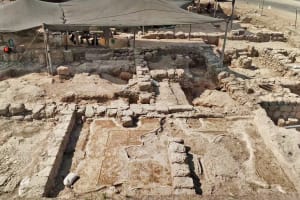Israeli government’s predictive AI aims to 'build a unified picture' of world events based on global trends

Israel’s Ministry of Innovation, Science and Technology is creating a predictive Artificial Intelligence program in order to “build a unified picture” of world events based on a detailed analysis of “global trends.”
The project, called Horizon Line, was presented at this week’s Beyond the Horizon 2025 conference.
Dr. Victor Israel, who is leading the Horizon department, spoke to Ynet News about the project, saying it is “essentially a laboratory for a changing reality, created to provide strategic alerts to government decision-makers.”
“Our aim is to identify emerging global trends and build a unified picture of what is unfolding,” he said, explaining that the project aims to create a synthesized analysis of trends across a variety of domains.
“We divide the world into eight core domains: ideologies, ideas and religions; climate and natural resources; demography; international relations; the global economy; social change; technology; and geopolitics,” Dr. Israel said. “The key point is the connection and mutual influence among all these domains. You cannot look at one in isolation and expect to understand how the world works.”
The Horizon Line Forum had its first meeting in 2017.
In 2022, then-Intelligence Minister Elazar Stern commented on the purpose of the initiative.
“We need this horizon scanning mechanism, which not only gives us a glimpse of the future, but also allows us to conduct long-term planning and prepare ourselves for future challenges,” he said.
Later that year, at another Horizon Line Forum meeting, Stern suggested that the purpose of analyzing these trends was not merely to predict the future, but to shape it.
“Are we just scanning the horizon, or are we scanning it in order to shape it? This is the difference between us and other government ministries,” Stern said.
“Our role is to lay out an infrastructure which consists of trends, risks and opportunities that are about to appear, and to turn them into actual working tools for government ministries, even in opposition to current trends,” he continued.
During the Ynet News interview, Dr. Israel said the project’s AI analysis shows that our world is undergoing “a transition from a unipolar world order dominated by the United States to a multipolar one.”
Asked if there were indications that World War III may be on the horizon, Dr. Israel said that “shifts from one world order to another are usually accompanied by a major war.”
He added that “some argue that World War III may not be a single war, but a sequence of regional conflicts,” and that “there’s debate over whether we’re already in it.”
Also predicted by the AI project is the increased reliance on humanoid robots.
“The Economy Ministry was advised to prepare for production lines run by robots, while the Welfare Ministry was advised to explore robotic care for the elderly,” he said, noting that the project seeks “to push the government system to act.”
Israeli Prime Minister Benjamin Netanyahu has made leadership in AI a priority for the Israeli government, saying he has “set the goal of turning the State of Israel into the No. 3 country in the world in this field” (after the United States and China).
In July of this year, Israel and America signed a memorandum of understanding “to advance collaboration on energy and artificial intelligence.”
“America and Israel are the prime innovation nations on the planet,” Netanyahu said at the signing, arguing that the memorandum will be considered an important moment in history.
“This day will be remembered,” he predicted. “Not every signing ceremony is as significant as this. This is very significant.”

The All Israel News Staff is a team of journalists in Israel.
You might also like to read this:

















